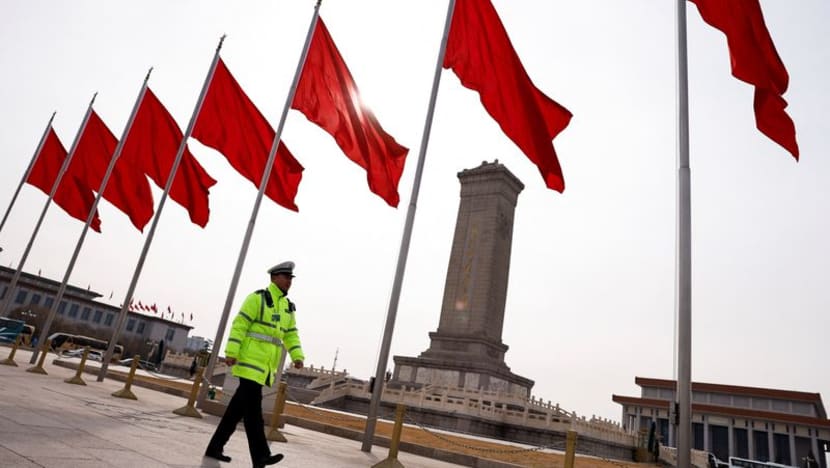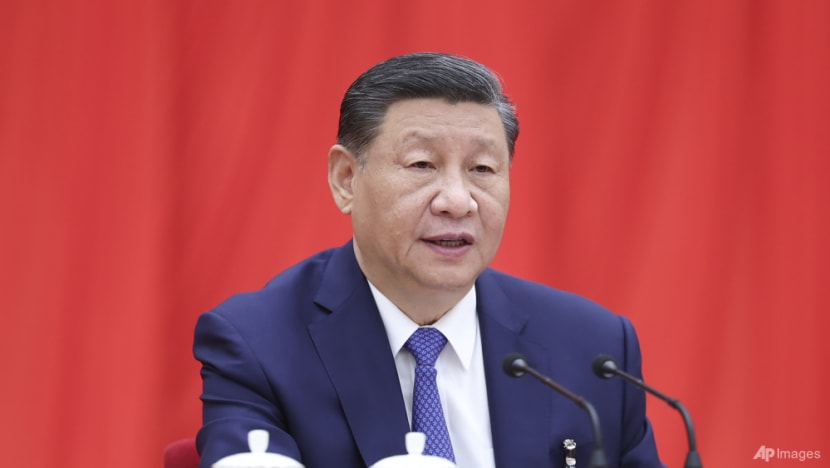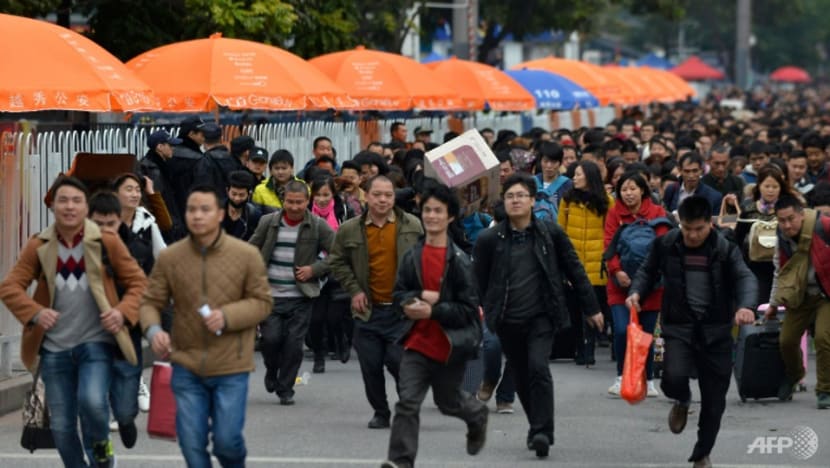Analysis: ‘Decisive role’ to ‘better leverage’ - China’s third plenum outcomes suggest diminished role of market
A reform-focused meeting of China’s Communist Party Central Committee yielded a communique long on commitments but short on specifics. Indications of Beijing’s economic priorities can already be seen even as a clearer picture is yet to emerge, say analysts.

A police officer walks past red flags, on the day of the opening session of the Chinese People's Political Consultative Conference (CPPCC), at Tiananmen Square, in Beijing, China March 4, 2024. (Photo: REUTERS/Tingshu Wang)

This audio is generated by an AI tool.
SINGAPORE: China has hinted at a potentially diminished role of the market in driving its economy, analysts say, as they point to clues being offered in the reported outcomes of an economic reform-centred meeting held this week by the upper echelons of China's Communist Party (CCP).
Known as the third plenum, the four-day closed-door gathering of the CCP Central Committee wrapped up on Thursday (Jul 18) with a communique that was expectedly long on commitments, running the gamut of topics, but short on specifics.
A press conference the next day (Jul 19) yielded little insights as party officials doubled down on the pledges. The third plenum had been closely watched for hints on China’s policy direction amid a troubled domestic and external landscape.
Still, there were takeaways. Analysts CNA spoke to highlighted the shift in the language used in the 5,000-word communique, specifically to the role of the market.
The document states that it is necessary to “better leverage” the role of the market, foster a fairer and more dynamic market environment, and make resource allocation as efficient and productive as possible.
“DECISIVE ROLE” TO “BETTER LEVERAGE”
This is a departure from the free market being granted a “decisive role” in resource allocation as stated in the 2013 third plenum, the first overseen by President Xi Jinping, observers point out.

At the time, this was seen as a key indicator that China would take tangible strides in opening up economically, especially when coupled with Mr Xi saying as well that the private sector should be treated on the same footing as state-owned companies.
“Better leverage” is a “less forceful” term, noted Mr Bert Hofman, an adjunct professor at the East Asian Institute in the National University of Singapore.
Dr Frank Tsai, founder and CEO of China Crossroads, said: “The party has seemingly given up on its feint towards the private sector from 2013 and acknowledged the reality … that the party was not willing to, and cannot and should not allow the market to play a decisive role.”
The word choice of “better” is key here, added Dr Tsai, saying this could suggest that the party acknowledges the concerns of Chinese businesses and that it must “do a better job” of improving economic growth and “unleashing the potential” of the private sector.
In recent years, China has carried out sweeping crackdowns on sectors such as tech, private tutoring and video gaming, sending chills through the industries and sparking a multi-trillion-dollar market wipeout.
Mr Neil Thomas, a fellow on Chinese politics at the Asia Society Policy Institute, cautioned against reading too much into the communique, especially during this early juncture.
“Until the plenum decision is published it is premature to conclude that the Party has dropped its formal commitment to let the market play a decisive role in resource allocation,” he told CNA. A more comprehensive report laying out the decisions is typically released several days after the third plenum.
“Officials made positive noises about promoting markets and encouraging businesses, but the proof will be in the pudding of the plenum decision, and even more so in whether firms actually see a change in their operating environment in China,” Mr Thomas added.
Similarly, Dr John Gong, professor of economics at the University of International Business and Economics in Beijing, told CNA “the devil is in the details” when it comes to shoring up the economy.
“We have to be very patient about what exactly the reforms will be introduced, and how likely these reforms will be indeed implemented to their full potential.”
ADVANCING CHINESE MODERNISATION
The latest third plenum was keenly watched as it took place after a months-long delay. Since the 1990s they’ve mostly been held in autumn, aside from the 2018 edition where the central committee proposed the removal of the two-term presidential term limit.
There was also much anticipation as the event carries historical heft. In December 1978, then paramount leader Deng Xiaoping used the high-level gathering to announce economic reforms, notably opening up the world’s second-largest economy to private and foreign capital.
In this plenum, the central committee adopted a resolution on “further deepening reform comprehensively to advance Chinese modernisation”, as stated in the communique. During the Friday press conference, Chinese officials called this “the most important outcome” to advance Chinese modernisation.
As part of this endeavour, a commitment was made to a “new development philosophy”, revolving around “high-quality economic development” and “all-around innovation” in a nod to the high-tech push currently being pursued.
The document also laid out how China wants to realise a “high-standard socialist market economy” by 2035. The phrase has surfaced before, such as in March 2023 in the CCP Central Committee’s flagship magazine Qiushi.
Dr Tsai from China Crossroads likened the term to “putting old wine in new bottles”.
“From the very start of Deng Xiaoping’s market reforms, the idea was always that the market was a necessary step in the achievement of socialism, the innovation being that no socialist society could be built without a middle-class society and the unleashing of the productive, material base to make socialism possible,” he said.
“(The CCP is acknowledging it must) direct its considerable investment to make sure China moves up the manufacturing value chain, especially in the fundamental technologies that the US is now trying so hard to deny China,” he added.
“A bad outcome would be a middle-income China without the high-value production that can achieve the party’s goals of full modernisation and technology autonomy vis a vis the United States.”
China has been facing tightening restrictions on access to Western advanced technology, such as computer chips and artificial intelligence, as it tussles with the US in a rivalry marked by American claims of overcapacity and counterclaims of containment.
“COMRADE” QIN GANG
Personnel changes were also confirmed by the Central Committee as laid out in the communique, with the wording used for one particular individual drawing particular attention.
As widely anticipated, the expulsion of former defence minister Li Shangfu from the CCP for was endorsed. State media first made the announcement on Jun 27 that Li had been kicked out of the party for “serious violations of discipline”, together with his predecessor Wei Fenghe.
The report at that time also laid bare the nature of his crimes for the first time, stating that he was suspected of receiving "huge sums of money" in bribes as well as bribing others. He also did not fulfil “political responsibilities" and "sought personnel benefits for himself and others".
Alongside Li, the removals of top People’s Liberation Army Rocket Force generals Li Yuchao and Sun Jinming were formalised during the third plenum, also for “grave violations of Party discipline and state laws”.
Current defence minister Dong Jun - who succeeded Li two months after his sacking - was not raised into the elite Central Military Commission during the third plenum as some analysts had predicted.
Pointing this out, Mr Neil Thomas, a fellow on Chinese politics at the Asia Society Policy Institute, told CNA the recent corruption scandals “appear to have eroded the political power of the military”.
But it was the resignation of former foreign minister Qin Gang from the central committee that arguably raised the most eyebrows, especially with the wording used in the communique.
Qin was removed from his post after just seven months amid speculation he had an extramarital affair that potentially compromised national security, making him the shortest-serving foreign minister in the country's modern history.
The communique referred to him as a “comrade” or “tongzhi” in Chinese while stating that the central committee had accepted his resignation from the body. The term is commonly used among CCP members, and analysts have seized on what appears to be deliberate wording.
“(It could suggest) his disciplinary infractions were more personal than political and that Xi has the political capital necessary to protect his one-time protege from harsher punishment,” said Mr Thomas.
Mr Qin was handpicked by President Xi himself. Before his downfall, he was considered a close confidant of the Chinese leader and had rapidly ascended the political ranks.
“Xi's ability to advance his policy agendas, punish the military, and protect Qin Gang suggests that he remains in firm control of the Communist Party,” said Mr Thomas.
GETTING THE JOB DONE BY 2029
The communique set a deadline of sorts for the reform tasks outlined in the resolution - stating that they “shall be completed by the time the People's Republic of China celebrates its 80th anniversary in 2029”.
With just five years to go, Dr Gong pointed out that the key is to maintain local government debt levels. Otherwise, he said, it will spell “deep trouble.”
Local government debt rose by 14.3 per cent on-year to 41.4 trillion yuan (US$5.7 trillion) by the end of February, according to data from the Ministry of Finance and reported by state-run news agency Xinhua, raising worries about wider economic stability.
“We’re not talking about paying off all these debts. I don't think within five years we're going to pay off all local government debt - that’s a huge, huge amount. I think as long as the cash flow at the local government fiscal level is sustainable and somewhat balanced, we are okay.”
Dr Wang Huiyao, founder and president of the Center for China and Globalization (CCG), believes urbanisation will be the “biggest driver of the future Chinese economy”. To this end, he told CNA that easing urban housing policies on the country’s vast migrant worker population will likely be pivotal.

China’s urban population currently stands at around 67 per cent, according to 2023 data from Statista. But only 50 per cent of them have hukou - or household registration system - according to Dr Wang.
Hukou is closely related to one’s economic status. Individuals have to register with local authorities to gain residency, but strict criteria effectively restricts many people living in rural regions from moving to urban areas for work.
“So how to leverage the 300 million migrant workers into the urbanisation tribe is the next biggest push, I think, to lift the real estate economy, consumption and many more,” said Dr Wang.
Mention was made in the communique of improving urban-rural integration and development, along with deepening land reform as longer-term strategic directions. Still, details were scant, as was the case for the other topics.
Other than 2029 and 2035, China has previously made clear it aims to build a “modern socialist country that is prosperous, strong, democratic, culturally advanced and harmonious" by 2049, the centenary of the founding of the People's Republic of China.
Analysts say a clearer picture of China’s development path is only set to emerge further down the line.
Mr Thomas from the Asia Society Policy cited key watchpoints like the upcoming Central Economic Work Conference in December and the two sessions next March.
He also highlighted China’s next five-year plan for 2026 to 2030. These plans are typically drawn up and finalised during the CCP’s fifth plenum.
“The real test of Xi's political power - rather than just his political control - is whether he can get the Chinese system to implement his policies in the coming months and years,” said Mr Thomas.
Even as uncertainties hang, Dr Wang struck a positive note on the recently-concluded third plenum.
“It's a confidence boost and a rallying of the confidence to unify the country and minds, and the people. This is really a significant way to push things forward.”
















